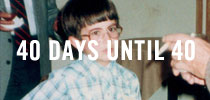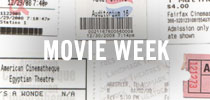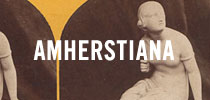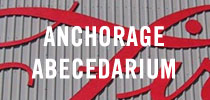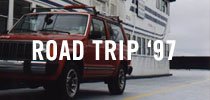Aimee and I (along with a small theater’s worth of moviegoers) enjoyed a preview screening of the latest effort from the ever-tightening spiral that is Charlie Kaufman’s brain, Eternal Sunshine of the Spotless Mind. I really enjoyed it, and found it exhilaratingly imaginative and a lot of fun to watch. Jim Carrey was terrific (I don’t think I’ve said that before), staying well inside himself, and Kate Winslet and Mark Ruffalo (who can do very little wrong) were also very good. I felt less flabbergasted than I remember feeling watching “Adaptation.,” but this film is even more compressed and dizzying. Part of the beauty of the movie was that while it was ostensibly about what happens when you choose to erase certain memories from your mind, the film spent very little time bothering to show us how it was done through high-tech effects and graphics; instead, the technique seemed to involve an old Osborne computer, a big metal helmet, some cables, and a sharpie. I love low-tech high-tech, like we see in Brazil and Delicatessen; it takes the weight of the plot off the technology and places it on the characters, while also giving the audience something intriguing and fun to look at.
Anyway, both Kaufman and the film’s director, Michel Gondry, were on hand after the screening to field questions from the moderator, our pal J.D. from work, and from the audience. After a half-dozen or so of these big-name previews like Lost in Translation, David Gale, and The Truth About Charlie (and I say big-name, I mean with director or lead actor in person, not that the films were all necessarily that good), I’m convinced there’s a network of about fifty people who get all of the passes and attend all of the films, and ask the questions. Now, admittedly, I must be in that network because I get the same passes, but there are certain people – Brattle Boy, the woman who asked Charlie Kaufman for a hug after describing the film as a “drug trip,” and others – who I keep seeing every time I attend one of these. And as soon as I see them, I remember just how painful the Q & A sessions afterwards are. This one was no exception; malfunctioning microphones, a reticent screenwriter who didn’t understand (or at least pretended not to) the over-complicated questions, a fanboy-crowd that just wanted him to talk about Being John Malkovich and went home disappointed. Things improved by the end, and we got some nice insights into the movie, as well as into Kaufman’s idea for “Las Vegas Las Vegas,” a take on the “New York New York”-style reproductions of cityscapes in Vegas casinos. His would incorporate every other casino in Vegas into one, albeit on a slightly reduced scale, “so you’d never have to leave” the one casino to experience everything Vegas had to offer. It was funnier when he told it.


